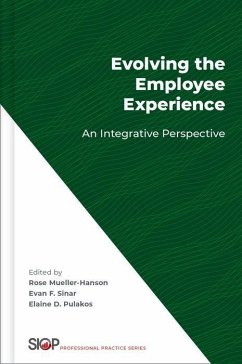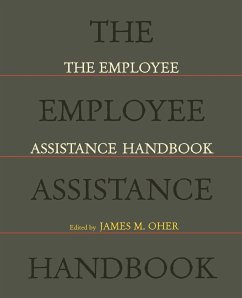
The equal opportunity illusion: The effects of prejudice and power on information seeking, employee evaluation, task assignment, and estimates of employee success
Versandkostenfrei!
Versandfertig in 1-2 Wochen
74,00 €
inkl. MwSt.

PAYBACK Punkte
0 °P sammeln!
Diploma Thesis from the year 2003 in the subject Psychology - Social Psychology, grade: 2,0, University of Marburg (Psychologie), language: English, abstract: Inhaltsangabe:Abstract:This study tested the effects of individual variables (prejudice level) and situational factors (power instructions) on information seeking strategies, employee evaluation, estimation of likely success, and task assignment in an employer employee, ethnicity relevant experimental design, with subjects always assigned the role of employer and an ostensibly other person (a same gender black individual depicted in a ph...
Diploma Thesis from the year 2003 in the subject Psychology - Social Psychology, grade: 2,0, University of Marburg (Psychologie), language: English, abstract: Inhaltsangabe:Abstract:
This study tested the effects of individual variables (prejudice level) and situational factors (power instructions) on information seeking strategies, employee evaluation, estimation of likely success, and task assignment in an employer employee, ethnicity relevant experimental design, with subjects always assigned the role of employer and an ostensibly other person (a same gender black individual depicted in a photograph) assigned the role of employee. Subjects (N=60) were categorized into groups that varied on power (exclusive or inclusive leadership instruction) and prejudice (quartile split of MRS scores). Participants were asked to select a subset of questions and tasks from various lists for the ostensibly other subject to answer. Participants at a later point in the experiment rated selected questions and tasks. At the end of the experiment the participants were asked to give a final employee evaluation and estimation of likely success for a future project.
Next to the attempt of replicating generally accepted and expected interrelations of power and prejudice with certain attention (information seeking) strategies and the use of stereotypes and their effect on evaluation and estimation, one of the main focuses of this study is on the effects of the above variables on behavior (final task assignment).
Consistent with predictions participants with a low prejudice level assigned more valued tasks, focused more on strength of the employee and estimated greater employee success than did high prejudice participants. Also participants with inclusive leadership instructions assigned relatively more skill tests with supporting help and estimated greater
employee success than participants with exclusive leadership instructions. Interaction -
effects across the skills test- information seeking-, employee evaluation-, final task assignment-, and estimated success- variables showed that high prejudiced participants in the exclusive leadership style condition respond in stereotype consistent ways significantly more often than participants in the inclusive leadership condition and low prejudice participants.
Zusammenfassung:
Diese Studie untersuchte den Einfluss individueller (Vorurteilslevel) und situationaler Faktoren (induzierter Machtstatus) auf Strategien der Informationssuche, der Bewertung eines Bewerbers in einer Bewerbungssituation, der Einschätzung von Erfolgschancen, sowie der Aufgabenverteilung. Das Untersuchungsdesign wurde als Arbeitgeber-Arbeitsnehmer Kontext mit ethnischer Relevanz konstruiert. Dabei wurde den Versuchspersonen immer in der Rolle des Arbeitgebers mit einer fingierten anderen Person als Arbeitnehmer (eine gleichgeschlechtliche Person mit afro-amerikanischer Herkunft, welche nur auf einem Foto sichtbar war)zugewiesen.
Die Versuchpersonen (N=60) wurden in verschiedene Gruppen eingeteilt, die sich hinsichtlich ihres Machtstatus (Instruktionen, die anwiesen den Arbeitnehmer auszuschließen oder mit einzubeziehen) sowie ihrer Vorurteilsausprägungen (Werte auf der modern racism scale ) unterschieden.
Versuchpersonen wurden gebeten eine Auswahl von Fragen und Aufgaben aus verschiedenen Listen auszuwählen, die anschließende zur Bearbeitung dem Arbeitnehmer vorgelegt werden sollten.
Später sollten die Versuchspersonen die Ihnen zurückgereichten Arbeitnehmer-Leistungen bewerten. Schließlich gaben die Versuchspersonen noch eine Bewertung des Arbeitnehmers ab, die eine Einschätzung der Erfolgschancen dieser Person bei einem zukünftigen Projekt beinhaltete.
Neben dem Versuch einer Replikation allgemein akzeptierter Interkorrelationen zwischen Macht und Vorurteilen mit Strategien zur Informationssuche sowie Verwendung von Stereotypen, ...
This study tested the effects of individual variables (prejudice level) and situational factors (power instructions) on information seeking strategies, employee evaluation, estimation of likely success, and task assignment in an employer employee, ethnicity relevant experimental design, with subjects always assigned the role of employer and an ostensibly other person (a same gender black individual depicted in a photograph) assigned the role of employee. Subjects (N=60) were categorized into groups that varied on power (exclusive or inclusive leadership instruction) and prejudice (quartile split of MRS scores). Participants were asked to select a subset of questions and tasks from various lists for the ostensibly other subject to answer. Participants at a later point in the experiment rated selected questions and tasks. At the end of the experiment the participants were asked to give a final employee evaluation and estimation of likely success for a future project.
Next to the attempt of replicating generally accepted and expected interrelations of power and prejudice with certain attention (information seeking) strategies and the use of stereotypes and their effect on evaluation and estimation, one of the main focuses of this study is on the effects of the above variables on behavior (final task assignment).
Consistent with predictions participants with a low prejudice level assigned more valued tasks, focused more on strength of the employee and estimated greater employee success than did high prejudice participants. Also participants with inclusive leadership instructions assigned relatively more skill tests with supporting help and estimated greater
employee success than participants with exclusive leadership instructions. Interaction -
effects across the skills test- information seeking-, employee evaluation-, final task assignment-, and estimated success- variables showed that high prejudiced participants in the exclusive leadership style condition respond in stereotype consistent ways significantly more often than participants in the inclusive leadership condition and low prejudice participants.
Zusammenfassung:
Diese Studie untersuchte den Einfluss individueller (Vorurteilslevel) und situationaler Faktoren (induzierter Machtstatus) auf Strategien der Informationssuche, der Bewertung eines Bewerbers in einer Bewerbungssituation, der Einschätzung von Erfolgschancen, sowie der Aufgabenverteilung. Das Untersuchungsdesign wurde als Arbeitgeber-Arbeitsnehmer Kontext mit ethnischer Relevanz konstruiert. Dabei wurde den Versuchspersonen immer in der Rolle des Arbeitgebers mit einer fingierten anderen Person als Arbeitnehmer (eine gleichgeschlechtliche Person mit afro-amerikanischer Herkunft, welche nur auf einem Foto sichtbar war)zugewiesen.
Die Versuchpersonen (N=60) wurden in verschiedene Gruppen eingeteilt, die sich hinsichtlich ihres Machtstatus (Instruktionen, die anwiesen den Arbeitnehmer auszuschließen oder mit einzubeziehen) sowie ihrer Vorurteilsausprägungen (Werte auf der modern racism scale ) unterschieden.
Versuchpersonen wurden gebeten eine Auswahl von Fragen und Aufgaben aus verschiedenen Listen auszuwählen, die anschließende zur Bearbeitung dem Arbeitnehmer vorgelegt werden sollten.
Später sollten die Versuchspersonen die Ihnen zurückgereichten Arbeitnehmer-Leistungen bewerten. Schließlich gaben die Versuchspersonen noch eine Bewertung des Arbeitnehmers ab, die eine Einschätzung der Erfolgschancen dieser Person bei einem zukünftigen Projekt beinhaltete.
Neben dem Versuch einer Replikation allgemein akzeptierter Interkorrelationen zwischen Macht und Vorurteilen mit Strategien zur Informationssuche sowie Verwendung von Stereotypen, ...














